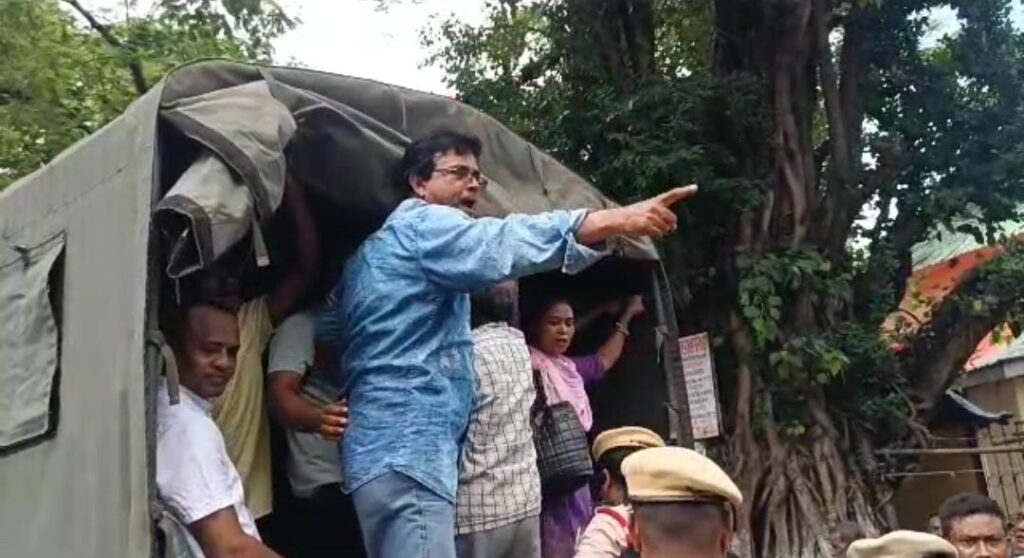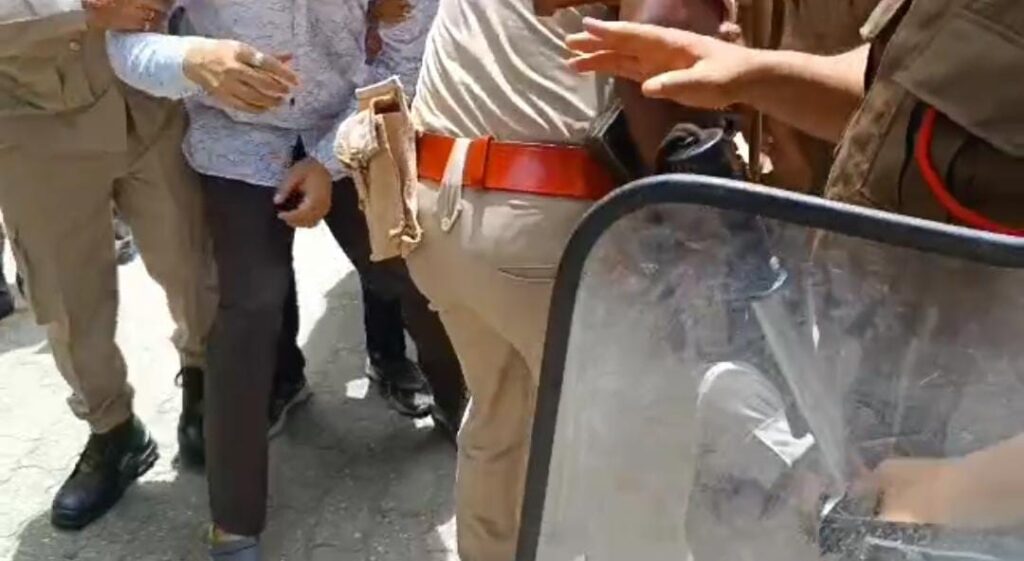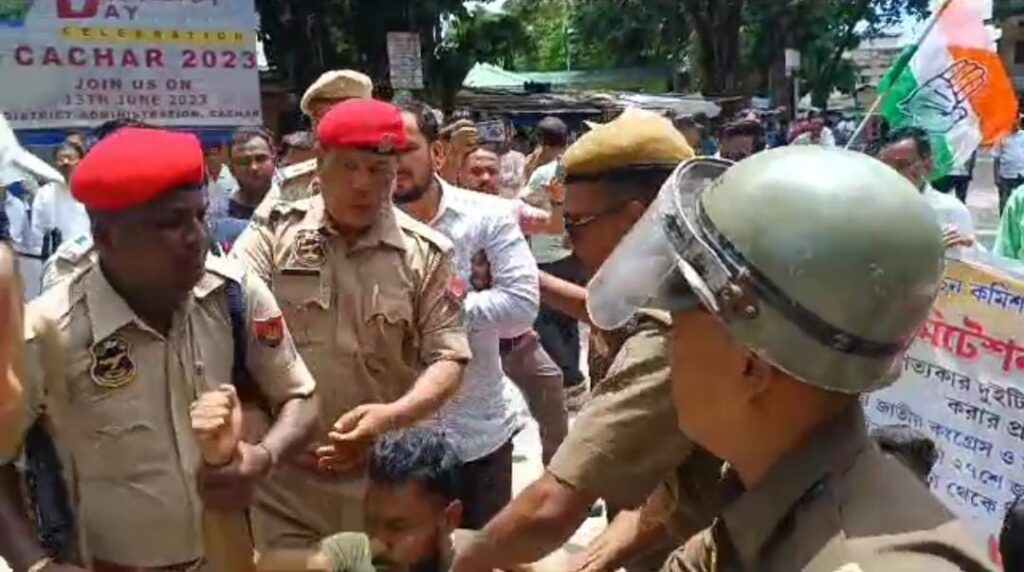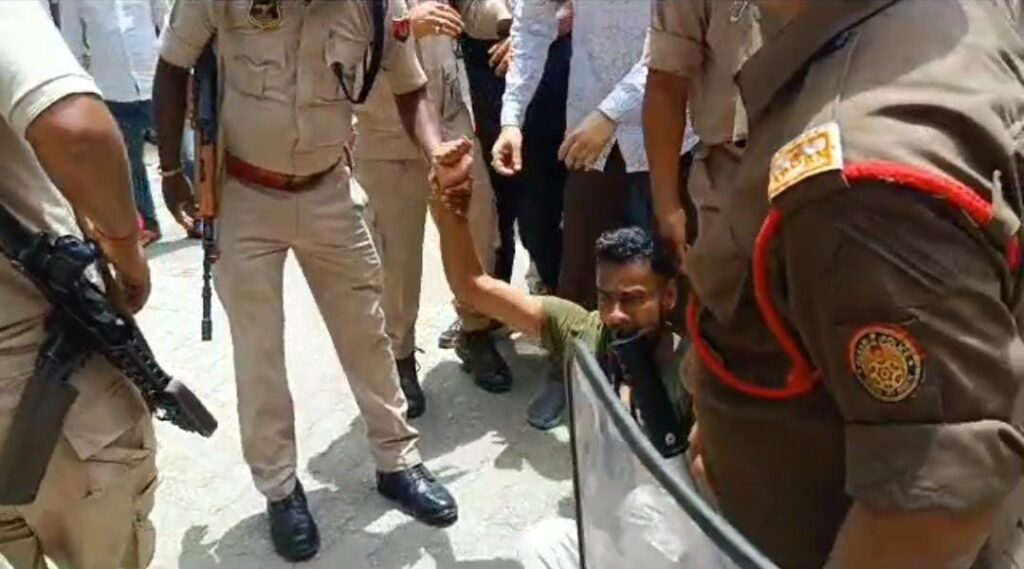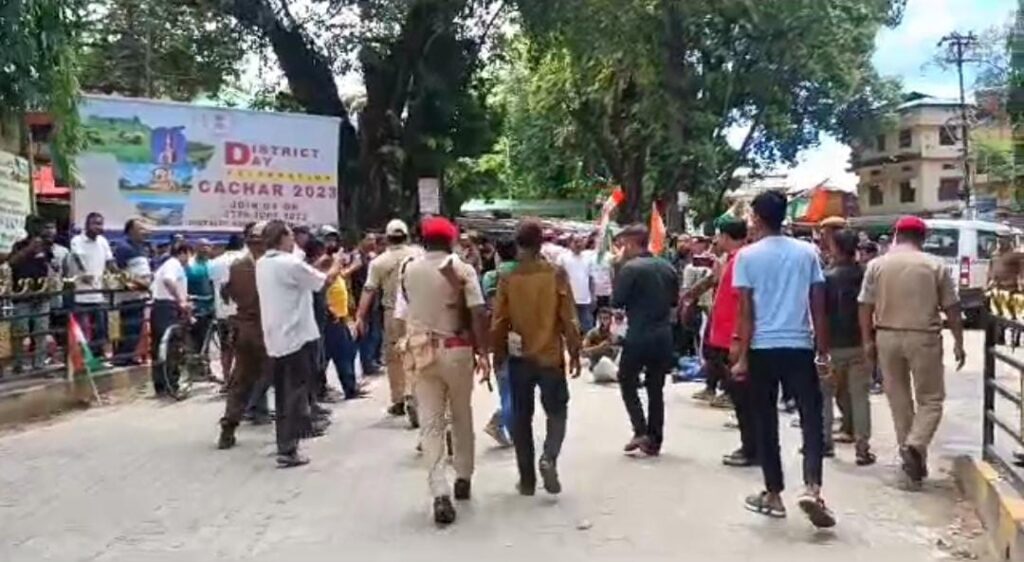Assam Police arrested a number of protestors in Karimganj and Cachar on Tuesday, June 27, who were holding a demonstration on Tuesday to protest against the draft delimitation proposal of the Election Commission of India (ECI). A number of organisations and political parties had earlier called for a 12-hour strike in Cachar, Karimganj and Hailakandi districts of Barak Valley in the state of Assam as a form of protest against the proposed delimitation draft published by the ECI.
In a move that has sparked outrage among residents of Assam’s Barak Valley, a week ago, on June 20, 2023 the Election Commission of India (ECI) unveiled a draft of the proposed delimitation for the region’s 126 assembly seats and 14 Lok Sabha seats. The move has been vociferously condemned as communal by renowned academics.
The draft has also been criticised by the Congress as being a pro-BJP move by the statutory ECI. The Barak Democratic Front (BDF) even called a bandh against it in the three districts of Barak Valley namely Cachar, Karimganj and Hailakandi on today, June 27, 2023. BDF Chief, Pradeep Dutta stated that they had decided to call for the bandh in the ‘larger interest of people’. The Congress Party too had called for a bandh, arguing that this move is a ‘conspiracy’ against the people of Barak Valley. The population of the Barak Valley that stood at 20 lakh, the last time that delimitation took place, it is today at 45 lakhs.
What has the draft proposed?
Delimitation is an exercise carried out by the ECI after a census. The next delimitation exercise for all over India will be carried out in 2026. The last all round Delimitation was conducted in 2008, however for Assam it had been deferred for later.
Writ petitions filed in the Supreme Court of India, one by Rajya Sabha member, Ajit Kumar Bhuyan and Dr Hiren Gohain and another by opposition party, AIUDF have stated that the reason for the earlier deferral of the delimitation exercise was its reliance on 2001 Census data which is outdated. India has not had a Census since 2011, which in any case would contain later, more updated data than that which is contained in 2001.
This legal challenge to the manner in which the ECI has conducted the delimitation exercise is pending with the next date on July 25, 2023 begging the question as to the legal basis and propriety of the ECI’s publishing the draft when the exercise is under challenge.
The current delimitation draft is based on 2001 census data. The petitions are scheduled to come up for hearing before the Chief Justice of India (CJI)’s bench on July 25,2023 and hence the undue haste in declaring the draft delimitation by the ECI is raising eyebrows.
The last delimitation took place in Assam in 1976. Since then, this is the first time the delimitation exercise has been attempted to be carried out in 2023. Three years from now, in 2026, a new round of delimitation will take place across India, with Lok Sabha seats increasing all over India. With the present new draft for Assam, the number of seats remains the same, which is 14 in Lok Sabha and 126 in the Vidhan Sabha. It is also possible that if this goes through, a fresh process of delimitation may not again take place in Assam in 2026.
The root of the controversy
The draft proposal has come under heavy criticism due to the (deliberate) elimination of certain assembly seats with Muslim-majority populations. These constituencies are currently represented by opposition party legislators from the Bengali-origin Muslim community, who are often stigmatised as “illegal” migrants.
According to the draft, these seats will either be merged or incorporated into newly-created constituencies, many of which have significant Hindu populations.
Previously, the Barak Valley, comprising the districts of Cachar, Karimganj, and Hailakandi, was allocated 15 assembly constituencies in the 2021 elections. However, the new draft seeks to reduce this number to 13, citing demographic changes as one of the reasons. Additionally, several constituency names are set to be modified under the proposed plan.
Furthermore, the draft reserves three assembly constituencies, where Muslims are in a considerable number, for candidates belonging to Scheduled Castes and Tribes. This effectively prevents minority leaders from participating in the elections for those seats where SC status is not accorded to minority religious populations like Muslims and Christians. Assam’s Muslim population is recorded as 34 percent in the last Census of India from 2011. About 3/4th of the Muslims in Assam are Bengali Muslims, who are frequently derided and persecuted on accusations of being ‘Bangladeshi immigrants.’ Thereby, such a procedure is not based on demographics but clearly, bias.
Several seats, including the current Chief Minister Himanta Biswa’s, will cease to exist according to a report by The Wire, if the draft is approved. Such leaders will require new constituencies for the 2024 Lok Sabha polls and 2026 assembly elections. Sarma’s current Jalukbari constituency will be divided into three parts, and Assam assembly Speaker Biswajit Daimary’s Panery constituency will no longer exist. Additionally, Forest Minister Chandra Mohan’s Patowary seat in Dharampur will cease to exist. Other seats that will be excluded include Transport Minister Parimal Suklabaidya’s Dholai constituency, as well as many seats held by MLAs.
Critics argue that this move is a brazen move by the ECI to favour the BJP. While it is no secret that the recently unveiled draft proposal by the Election Commission reflects the Bharatiya Janata Party’s (BJP) long-standing political stance favouring a delimitation exercise that would enhance the electoral prospects of Assam’s “indigenous” communities.
The BJP, in its 2021 election manifesto, had pledged to initiate a delimitation process to safeguard the political rights of the population. Assam’s Chief Minister, Himanta Biswa Sarma, specifically stated that a minimum of 110 seats should be reserved for the state’s “indigenous” people.
আমাৰ লক্ষ্য – জাতি, মাটি আৰু ভেটিৰ সুৰক্ষা
We are committed to protect the interests of our indigenous communities.
If the EC’s draft on delimitation is approved, people of Assam will have a greater say in their constituencies.
📍Lakhimpur#MahaJansamparkAbhiyan pic.twitter.com/sQ6ZWatM2L
— Himanta Biswa Sarma (@himantabiswa) June 23, 2023
What would this bill, if passed, mean for the people of Assam?
The proposed changes have sparked widespread concerns and have been met with criticism for potentially marginalising Muslim communities and limiting their political representation.
The draft proposal for constituency delimitation in Assam has raised concerns about the lack of consideration for population patterns. Despite Barak Valley having a higher population than the Bodoland Territorial Region (BTR), the number of constituencies in Barak Valley has decreased from 15 to 13, while in BTR, it has increased from 11 to 15. This decision seems to ignore the fact that Barak Valley has historically been home to Bengali-speaking people from both Hindu and Muslim communities, whereas BTR is predominantly inhabited by Bodo tribes.
The motive behind this appears to be a political strategy by Himanta Biswa Sarma and the BJP. In the last election, the BJP, along with its ally UPPL, performed exceptionally well in BTR, while Barak Valley predominantly elected either the Indian National Congress (INC) or the All India United Democratic Front (AIUDF). By increasing the number of seats in the BTR region, the draft aims to secure a favourable outcome for the BJP in the 2026 elections, while maintaining their hold on existing seats.
Many politically aware individuals in Assam perceive the draft proposal as a well-planned move by the BJP and Himanta. Although the responsibility of delimitation lies with the Election Commission of India (ECI), this belief is widespread. The draft also includes changes specific to certain districts. For example, Karimganj District, which has a Muslim-majority population, has seen the elimination of one seat. Similarly, Barpeta District, another Muslim-dominated area, has also lost one seat.
In Goalpara district, a seat with a Muslim majority has been reserved for the Scheduled Tribe (ST) community. Likewise, Barpeta LAC in Barpeta District, which is both Muslim-dominated and reserved for the Scheduled Caste (SC) community, has undergone changes.
The recent draft thus does not at all reflect grassroot geographical realities, an aspect that should be of utmost importance. For example, in faraway Dhubri district –set at a 250 kilometres distance from Barpeta– two LAC constituencies, Mandia and Chenga have been included in Dhubri HPC, simply seems to be aimed to bifurcate alleged of consolidated Muslims vote. Such irrational considerations by the ECI bode ill for both the representation and development of those regions.
Overall, the draft proposal raises concerns about the perceived lack of consideration for population patterns and the potential political motivations behind the changes.
What does the government say?
The ruling party, BJP, claims that the domination was done keeping focus on “Khilonjiya” (Indigenous people) people of Assam.
However, questions arise, who will be certified as Indigenous? Goriya, Moriya, Jolha, Deshi, Soyed were only certified as Indigenous according to the data of Assam assembly. But will the draft make grant reservations or special status for these indigenous communities?
Hajo LAC is Goriya (indigenous) community dominated and East Bilasipara LAC is Deshi (indigenous) community dominated but in the proposed draft Hajo LAC has been reserved for ST and East Bilasipara divided with other LAC. This would mean that in a Goriya concentrated district, the group would never have the opportunity to stand for election or see a representative from their community. This also goes against the principle with which certain constituencies were granted reserved or unreserved status.
Who in Assam are the indigenous people?
If Bengali speaking Muslims and Hindus are to be continued to be excluded from democratic rights and processes, this can hardly bode well for democracy in Assam. Let us have a look at what differing voices in Assam are saying:
The BJP’s ally partner AGP (Asom Gana Parishad), had made a special comment for Bongaigaon district that they are happy with the delimitation draft because it emphasises the importance of Indigenous people. According to them, in the assembly constituency of Bongaigaon district, one seat will be held by Koch Rajbongshi (indigenous) community.
But for a long period of time two constituencies of the Bongaigaon district had a concentration of Muslim and Bengali Hindu Scheduled Caste community, one 34 North Abhayapuri and 35 South Abhayapuri respectively. Now the new delimitation drafts by the ECI have made a division with other bordering constituencies and created two new constituencies named Manikpur and Abhayapuri constituency.
Not only in Lok Sabha or Vidhan Sabha, the religious population pattern has also been kept in mind at the panchayat level in this latest move by the ECI. Hence, if the draft is finally approved , future politics of Assam could well move towards a more polarising phase. There is a potentiality of the electoral discourse getting communalised, in some constituencies by Hindu communalism and in others by Muslim communalism.
Finally, as mentioned above, the population pattern according to recent numbers is much higher than what the current draft is based on for there were demographic changes after 2001 that reflected in the census of 2011. Thus if allowed unchallenged, Assam may data and analysis and policies in Assam will be impacted because the population pattern is not reflected in seats, that is electoral representation. If unchanged in 2026 too when the countrywide delimitation is scheduled to take place, Assam would be negatively impacted because the population pattern didn’t increase with the seat pattern.
Keeping all these factors in mind, it is clear that this ill-conceived exercise will not only be the loss of two communities or religion(s) but it bodes a loss for Assam.
An extreme majoritarian plank of politics has, in the past decades, used the plank of “implementation of the NRC (National Register of Citizens) to specifically target the already marginalised Bengali Muslim and Bengali Hindu population, The NRC’s finally released draft final list on August 31, 2019, revealed that there were next to no illegal foreigners in Assam, debunking the notion that a specific religious and linguistic community carried the burden of being “illegal outsiders”. Of the 29 people who have died in the state’s infamous detention camps, the bodily remains were sent to their homes in Assam instead of their supposed foreign countries.
CJP has closely witnessed firsthand how ordinary people were unfairly targeted and summoned to the Foreigners Tribunal. The repercussions of the Assam movement and NRC go beyond that, with a significant number of Foreigners Tribunal notices, 19 lakh exclusions from the NRC, 27 lakh exclusions from Aadhaar, and additional discriminations and structural violence against flood-affected farmers and daily labourers, which is often just based on their surnames. The Passport Act and Delimitation Draft serve as the latest iterations of these discriminatory practices by the state.
It is to be seen now, how, when the petition filed by Dr Hiren Gohain and Rajya Sabha member, Ajit Kumar Bhuyan comes up on July 25, and where the proceedings will go. The writ petitions in the Supreme Court challenge the Delimitation Draft proposed by the ECI.
Related
Resolute and Determined: CJP Assam makes headway through 2023
Assam Woman granted Indian Citizenship after CJP’s tireless advocacy
Even the Dead Are Not Spared: A Tragic Tale of NRC’s Heartless Grip on Assam
CJP moves NCM against the repeated hate speeches by Pravin Togadia
CJP Impact- असम में दो विधवा औरतों को बांग्लादेशी के आरोप से मिला छुटकारा, नागरिकता प्रमाणित

